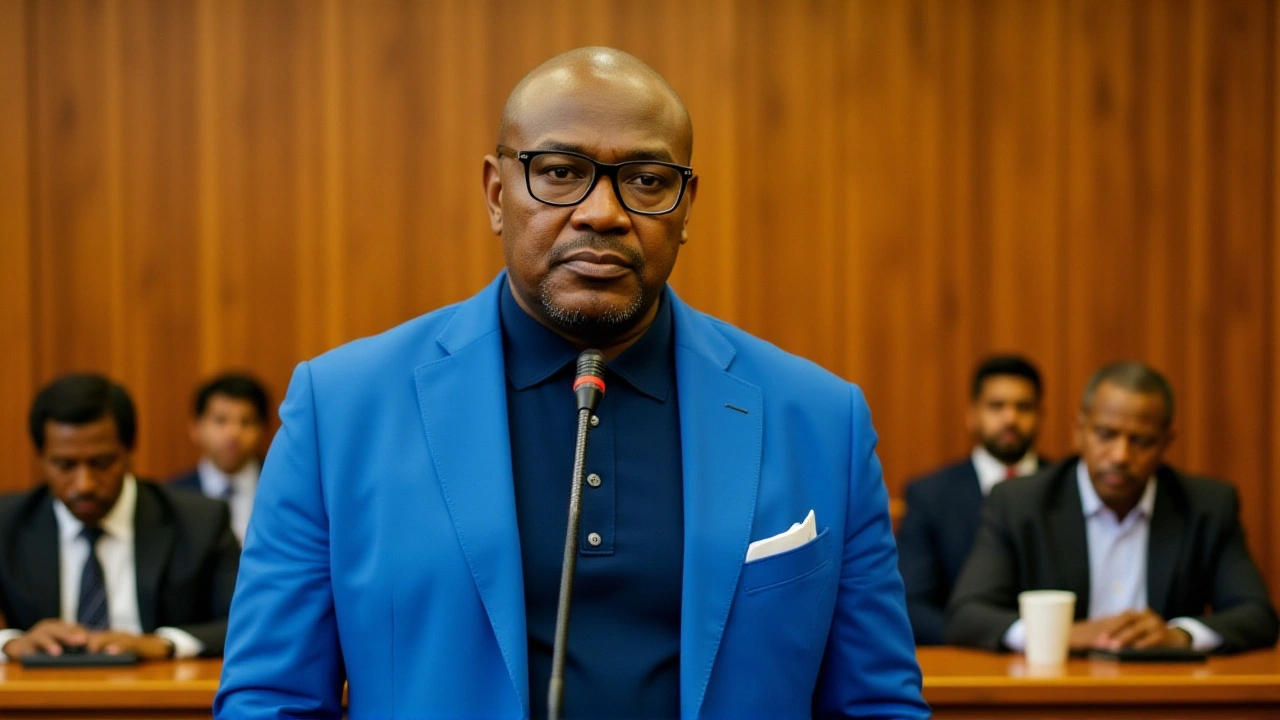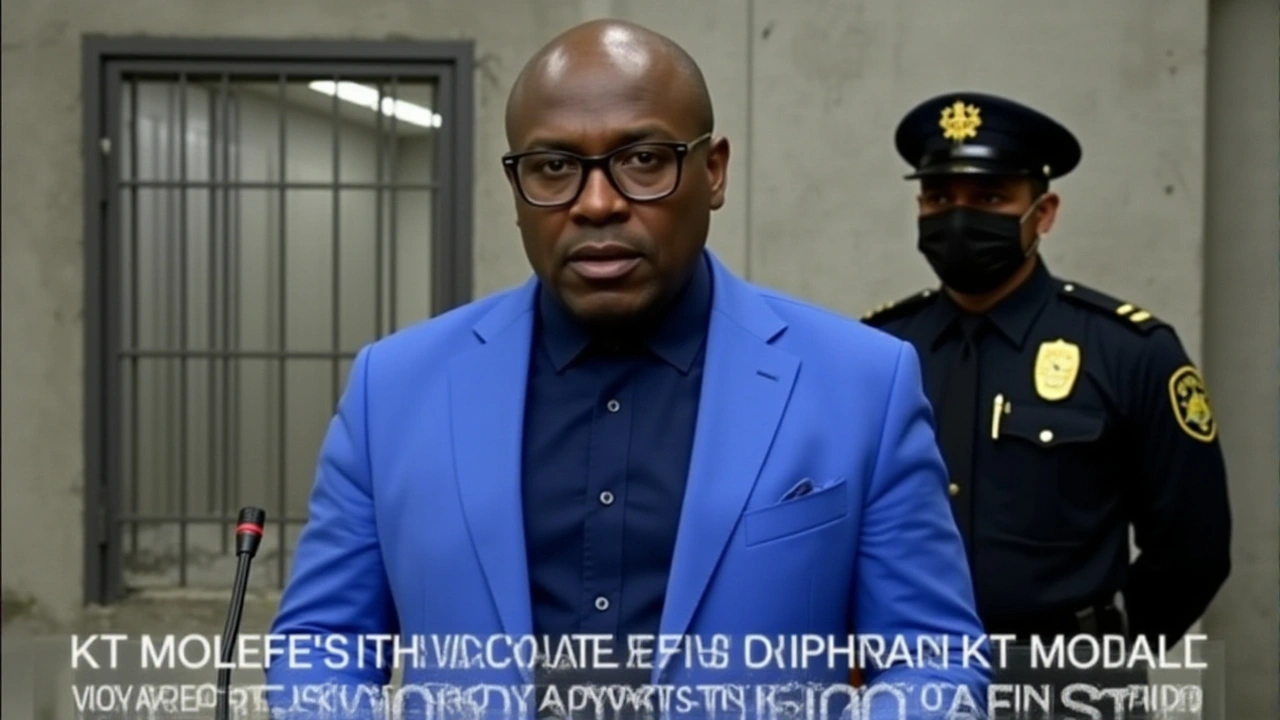
When Katiso 'KT' Molefe, businessman walked out of the Johannesburg High Court on October 10, 2025, he did so on a R400,000 bail package – a stark reversal of the Alexandra Magistrate’s Court’s August 20 decision that kept him behind bars.
The 12:32 AM UTC ruling, handed down by Brad Wanless, Judge, not only reset the bail amount but also sent shockwaves through South Africa’s criminal‑justice landscape, given Molefe’s alleged role in a string of high‑profile murders that have haunted Gauteng since 2022.
Background of the murders and the charges
The saga began on November 20, 2022, when a convoy of vehicles at the corner of Woodmead and Woodland Drives in Sandton erupted in gunfire. The attack claimed the life of noted music producer Oupa John Sefoka, better known as DJ Sumbody, along with his bodyguards Sibusiso Mokoena and Sandile Myeza. The violent episode was later linked to Molefe, who prosecutors allege was the mastermind behind the hit.
Since that night, additional homicides have been tied to the alleged drug‑cartel network allegedly headed by Molefe. These include the murders of DJ Vintos (real name Hector Bhutlesi) and engineer Aman Swat, as well as charges of conspiracy to commit murder and illegal possession of firearms. In total, Molefe faces multiple counts of murder, each carrying life‑sentence potentials.
High Court decision and bail conditions
Judge Wanless dismissed the state’s opposition to the appeal, calling it “not based on any real evidence.” He noted that, despite the seriousness of the alleged crimes, there was “no objective evidence … to show that granting bail would conflict with the provisions of the Criminal Procedure Act.” The judge declared the Alexandra Magistrate’s Court had “misdirected itself” and set aside its refusal.
The bail package now consists of two components: an earlier R100,000 bail granted by the Pretoria division (case A112/2025) and the fresh R400,000 order from Johannesburg. Molefe must adhere to strict conditions, including:
- Reporting to Morningside Police Station three mornings (06:00) and three evenings (18:00) each week – specifically on Mondays, Wednesdays and Fridays.
- Geographical restriction to Gauteng province, with a written notice requirement before any travel beyond its borders.
- Permission‑only trips to Welkom in the Free State for business purposes, once the investigating officer receives written notification.
- A blanket prohibition on contacting any state witnesses linked to the murder investigations.
Failure to comply could see the bail revoked and a custodial sentence imposed pending trial.
Reactions from the National Prosecuting Authority and legal experts
The National Prosecuting Authority (NPA) issued a terse statement: “Disappointing outcome. Of course, we were not expecting such an outcome. However, as the NPA, we take it on the chin and we move forward… we accept the judgment and will be studying it further.” Legal analysts argue the decision underscores a broader tension between bail jurisprudence and public safety in South Africa.
Professor Lindiwe Makgoba of the University of Pretoria’s law faculty remarked, “The High Court is emphasising the principle that bail is a right, not a privilege, even in serious murder cases – provided the procedural safeguards are met. This could set a precedent for future high‑profile appeals.” Conversely, victim‑advocacy groups fear the ruling could embolden other alleged gang leaders, noting the emotional toll on families of DJ Sumbody and the other victims.

Implications for South Africa’s criminal‑justice system
This case shines a light on how South African courts balance the presumption of innocence with the public’s demand for safety. The Criminal Procedure Act allows bail for serious offenses if the accused does not present a flight risk or pose a danger to the community. By granting Molefe bail, the court effectively said the state had not proven either.
Critics point out that the bail amount – R400,000 – is steep but arguably within reach of a wealthy entrepreneur, raising questions about equality before the law. The decision also forces the NPA to reassess its evidentiary strategy for future appeals, potentially prompting more rigorous forensic and witness‑protection measures.
What’s next in the Molefe murder trial?
With bail secured, Molefe will remain under police supervision while the prosecution continues to build its case. Preliminary hearings are slated for early November 2025, followed by a full trial that could stretch into 2026. The NPA has signalled plans to introduce fresh forensic evidence and re‑interview key witnesses, many of whom have been placed in protective custody.
Should Molefe violate any of the bail conditions – especially the travel restriction or witness‑contact ban – the High Court can swiftly revoke his freedom. Meanwhile, the families of the slain musicians have vowed to keep the spotlight on the case, demanding that justice be served, bail or no bail.

Key Facts
- Date of bail ruling: October 10, 2025
- Judge: Brad Wanless, Gauteng High Court, Johannesburg
- Primary bail amount: R400,000 (in addition to earlier R100,000)
- Charges: Multiple murders (including DJ Sumbody, DJ Vintos, Aman Swat), conspiracy, illegal firearms
- Reporting requirement: Morningside Police Station, three mornings and three evenings weekly
Frequently Asked Questions
How does the bail decision affect the ongoing murder trial?
Molefe’s release on bail means he will remain free under strict monitoring while the NPA prepares its case. The trial schedule is expected to continue without delay, but any breach of bail conditions could lead to immediate re‑arrest and potential additional charges.
What were the main reasons the High Court gave for overturning the magistrate’s denial?
Judge Wanless argued that the state offered no concrete evidence that Molefe’s release would jeopardise public safety or conflict with bail statutes. He described the earlier refusal as “misdirected,” emphasizing that the Criminal Procedure Act mandates bail unless a clear flight risk or danger is proven.
Who are the victims and why is this case high‑profile?
The primary victim, DJ Sumbody (Oupa John Sefoka), was a beloved music producer whose death shocked the South African entertainment scene. His bodyguards, Sibusiso Mokoena and Sandile Myeza, also perished. Subsequent murders of DJs and a prominent engineer linked to the alleged drug network amplified media attention and public concern.
What are the bail conditions Molefe must obey?
He must report to Morningside Police Station at 06:00 and 18:00 on Mondays, Wednesdays and Fridays, stay within Gauteng province unless he notifies the investigating officer in writing about travel to Welkom, and avoid any contact with state witnesses. Failure to comply can result in bail revocation.
What does the NPA plan to do after the bail ruling?
The NPA said it would study the judgment closely, strengthen its evidentiary package, and proceed with preparatory hearings. Officials indicated they will seek additional forensic analysis and may request stricter bail conditions if new risks emerge.
Comments (20)
-
Grace Melville October 11, 2025
The bail package forces Molefe to report to Morningside Police Station three mornings and three evenings each week, keep his movements inside Gauteng, and cut off any contact with state witnesses. It’s a pretty strict schedule, but it’s meant to balance his rights with public safety.
-
Ashlynn Barbery October 13, 2025
While the High Court’s decision adheres to the principle that bail is a right, it simultaneously raises concerns about how wealth can influence judicial outcomes. The presumption of innocence must be protected, yet the safety of communities affected by these alleged crimes cannot be ignored.
-
Sarah Graham October 15, 2025
It’s worth noting that the bail amount-R400,000-is significant, but likely affordable for someone of Molefe’s reported means. This disparity highlights broader issues of equality before the law in South Africa.
-
Jauregui Genoveva October 17, 2025
Honestly, it feels like the system is giving a free pass to a rich guy while victims’ families keep grieving 😒. Justice should be blind, not golden.
-
Quinten Squires October 19, 2025
The concept of bail, rooted in common‑law traditions, serves as a pre‑trial liberty mechanism contingent upon the accused not being a flight risk or a danger to the public. In Molefe’s case, the judge found no concrete evidence to substantiate either risk, which aligns with statutory thresholds under the Criminal Procedure Act. However, the sheer gravity of the alleged offenses-multiple murders tied to a criminal network-makes this a borderline scenario. Bail amounts are calibrated to reflect both the seriousness of the charges and the accused’s financial capacity; R400,000 plus a prior R100,000 is substantial yet arguably within reach for a wealthy entrepreneur. The reporting requirements-six check‑ins per week-are unusually burdensome, indicating the court’s attempt to mitigate any perceived threat while preserving the accused’s liberty. Geographical restrictions to Gauteng further tighten supervision, limiting potential flight opportunities. The prohibition on contacting witnesses aims to protect the integrity of forthcoming testimony, a standard safeguard in high‑profile cases. Critics argue this leniency could set a precedent where affluent defendants receive preferential treatment, undermining public confidence. Supporters counter that the presumption of innocence must remain sacrosanct, regardless of media pressure. The NPA’s statement acknowledges disappointment but also signals a readiness to adapt its evidentiary strategy, perhaps tightening future bail applications. From a policy perspective, balancing individual rights with collective security remains a delicate jurisprudential dance. The upcoming preliminary hearings will test whether the prosecution can present the missing evidentiary links that the court found lacking. If new forensic data emerges, it could reshape the bail narrative entirely. Ultimately, this case underscores the ongoing tension between legal principles and societal expectations of justice.
-
Tyler Manning October 21, 2025
It is imperative to recognize that the adjudication reflects a meticulous application of statutory criteria, wherein the absence of demonstrable flight risk or imminent danger supersedes public outcry, thereby upholding the rule of law.
-
james patel October 23, 2025
From a procedural standpoint, the appellate court applied the bail jurisprudence framework, emphasizing the burden of proof lies with the prosecution to establish prima facie risk factors under the Criminal Procedure Act.
-
Scarlett Mirage October 25, 2025
Wow!!! So we’re basically letting a alleged gang boss walk free while the victims’ families wait in limbo??? This is absurd!!!
-
Ian Sepp October 27, 2025
The court’s decision is consistent with precedent, but the optics are certainly challenging for public perception of fairness.
-
Jody Webster October 29, 2025
i think this decision is totally unfair for the victims families its like a movie plot..
-
Steve Goodger October 31, 2025
From my perspective, this outcome illustrates a broader systemic disparity where monetary resources can substantially influence judicial discretion. It also reflects the tension between legal safeguards and community expectations for security. The balancing act the courts perform is critical, yet it can sometimes appear detached from the lived experiences of those directly impacted by violent crime. By setting a precedent that wealth can facilitate more lenient bail conditions, we risk eroding public trust in the criminal justice system. Conversely, denying bail indiscriminately could contravene fundamental rights enshrined in the constitution. Therefore, consistent, transparent application of bail criteria is essential to maintain both fairness and safety. I hope the upcoming hearings will bring clearer evidence that can either reaffirm this decision or prompt a reassessment of bail standards in high‑stakes cases.
-
johnson ndiritu November 2, 2025
Another day, another “justice” served with a side of emojis 😂😂. The NPA needs to step up, or else this will just be a headline.
-
sheri macbeth November 5, 2025
Oh great, bail granted-just what we needed. Now the “justice” system can go back to its comfy chair while the families keep waiting. 🙃
-
Lane Herron November 7, 2025
Sure, bail's a right, but when the right includes a multi‑million‑rand alleged crime lord strolling out, that's a corporate-level breach of public trust.
-
Henry Cohen November 9, 2025
i cant believe the courts is letting this guy out its like they dont care about the victims
-
Mark Langdon November 11, 2025
Look, the bail decision might sting, but it forces the NPA to sharpen its case. That’s a win for due process, even if it feels harsh now.
-
Ciara Russell-Baker November 13, 2025
this rul is so unfair i cant believe the judeges
-
Aaron Samarita November 15, 2025
Drama alert: Molefe’s about to be the most watched bail story of the year, complete with weekly police check‑ins and a nation holding its breath. Grab the popcorn.
-
Daisy Pimentel November 17, 2025
Justice will prevail.
-
Ellen Ross November 19, 2025
Enough of the polite debates-this bail decision is a slap in the face to every family searching for closure, and it must be challenged vigorously.
